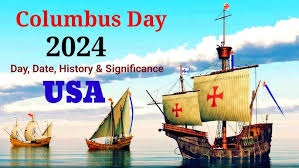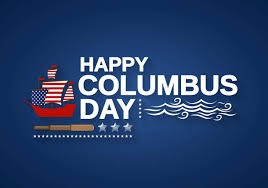Columbus Day 2024 in the United States

Columbus Day 2024 in the United States
Introduction
Columbus Day, a federal holiday in the United States, is observed annually on the second Monday of October. This day commemorates Christopher Columbus’s arrival in the Americas on October 12, 1492, an event that profoundly impacted world history. Columbus’s voyage marked the beginning of European exploration and colonization of the Americas, leading to the exchange of cultures, ideas, and goods that shaped the modern world. Columbus Day 2024 in the United States.

Columbus Day 2024 in the United States.
However, the celebration of Columbus Day has been a subject of controversy in recent years. Many Native American groups and others argue that Columbus’s arrival also marked the beginning of the suffering and exploitation of Indigenous peoples. As a result, some states and cities have replaced Columbus Day with Indigenous Peoples’ Day, which celebrates the history and contributions of Native Americans.
You may also like:
UNC Player Tylee Craft dies at 23 after cancer battle
This article provides a detailed examination of Columbus Day 2024, its historical significance, the growing movement towards Indigenous Peoples’ Day, and the current status of the holiday in the United States. Columbus Day 2024 in the United States.
Historical Background
The Life of Christopher Columbus
Christopher Columbus, an Italian explorer born in Genoa in 1451, is credited with opening the way for the European exploration of the Americas. Although he is often said to have “discovered” America, Columbus was not the first person to set foot in the New World. Indigenous peoples had lived in the Americas for thousands of years, and Viking explorers, such as Leif Erikson, had reached the continent centuries earlier.
Columbus embarked on his famous voyage under the sponsorship of Spain, led by King Ferdinand and Queen Isabella. In August 1492, Columbus set sail with three ships—the Niña, the Pinta, and the Santa María. On October 12, 1492, after weeks of navigating uncharted waters, his expedition made landfall on an island in the Bahamas, which he named San Salvador. While Columbus believed he had found a new route to Asia, he had in fact reached the Americas, leading to a series of expeditions that would forever change the world.

Columbus Day 2024 in the United States.
Early Celebrations of Columbus Day
The celebration of Columbus Day in the United States has its roots in the late 18th century. The first recorded celebration took place in 1792, marking the 300th anniversary of Columbus’s voyage. New York City’s Columbian Order, better known as Tammany Hall, held a ceremony to honor Columbus’s achievement. Columbus Day 2024 in the United States.
In the late 19th century, Italian-Americans began to celebrate Columbus Day as a way to express pride in their heritage. Being of Italian descent, Columbus was seen as a symbol of Italian-American achievement and contributions to the United States. In 1937, President Franklin D. Roosevelt proclaimed Columbus Day a national holiday, largely due to lobbying by the Knights of Columbus, a Catholic fraternal organization.
You may also like:
UNC Player Tylee Craft dies at 23 after cancer battle
Columbus Day in the Modern Era
National and Regional Observance
Columbus Day has been a federal holiday since 1971, celebrated on the second Monday of October each year. On this day, government offices, banks, and many businesses close in observance of the holiday. Schools may or may not close, depending on local policies. The day is marked by parades, ceremonies, and various cultural events, especially in cities with large Italian-American populations such as New York City, Chicago, and San Francisco.
The celebration of Columbus Day varies greatly across the United States. While it remains a federal holiday, some states and municipalities have opted to discontinue observing it, choosing instead to honor Indigenous Peoples’ Day. This shift reflects a growing recognition of the darker aspects of Columbus’s legacy, particularly his role in the colonization and oppression of Indigenous peoples.

Columbus Day 2024 in the United States.
The Controversy Surrounding Columbus Day
In recent decades, Columbus Day has become increasingly controversial. Critics argue that the holiday glorifies European colonization and overlooks the suffering inflicted upon Native American communities. Columbus’s arrival in the Americas led to the widespread displacement, enslavement, and death of Indigenous populations, as well as the introduction of diseases that decimated Native communities.
For many Indigenous people and their allies, Columbus represents not a heroic explorer, but a figure whose actions initiated centuries of exploitation and violence against their ancestors. These sentiments have given rise to the movement to replace Columbus Day with Indigenous Peoples’ Day, a holiday that honors the history, culture, and contributions of Native American peoples. Columbus Day 2024 in the United States.
Indigenous Peoples’ Day: A Growing Movement
Origins and Purpose
Indigenous Peoples’ Day was first proposed in 1977 at a United Nations-sponsored conference on discrimination against Indigenous populations in the Americas. Advocates argued that replacing Columbus Day with a day that celebrates Indigenous history would provide an opportunity to recognize the resilience and contributions of Native peoples, while also acknowledging the injustices they have faced.
You may also like:
UNC Player Tylee Craft dies at 23 after cancer battle
South Dakota was the first state to officially recognize Indigenous Peoples’ Day in 1990, and the movement has gained momentum in the years since. By 2023, dozens of states, cities, and towns had adopted Indigenous Peoples’ Day, either in place of or alongside Columbus Day. Columbus Day 2024 in the United States.
Indigenous Peoples’ Day in 2024
In 2024, Indigenous Peoples’ Day continues to gain traction across the United States. Cities such as Seattle, Los Angeles, Denver, and Albuquerque have officially replaced Columbus Day with Indigenous Peoples’ Day, as have entire states including Oregon, Maine, and New Mexico. The movement represents a growing awareness of the need to honor the contributions and histories of Native Americans and to reexamine the legacy of European colonization.
On Indigenous Peoples’ Day, many communities hold events that celebrate Native American culture, including traditional dances, music, art, and food. These events also often feature educational programs designed to raise awareness of Indigenous history and contemporary issues faced by Native communities.
The Status of Columbus Day in 2024
Federal Recognition and Local Observance
As of 2024, Columbus Day remains a federal holiday, and it is still observed in many parts of the country, particularly in regions with significant Italian-American populations. For many Italian Americans, Columbus Day is a source of pride, celebrating their heritage and the contributions of their ancestors to American society. Parades and celebrations in cities like New York and San Francisco continue to draw large crowds, with participants expressing their cultural pride through music, dance, and food.
You may also like:
UNC Player Tylee Craft dies at 23 after cancer battle
However, the number of states and municipalities choosing to replace or supplement Columbus Day with Indigenous Peoples’ Day continues to grow. This trend reflects an ongoing shift in public attitudes toward the holiday, as more people become aware of the complex history surrounding Columbus’s arrival in the Americas. Columbus Day 2024 in the United States.

Columbus Day 2024 in the United States.
Presidential Proclamations
Each year, the President of the United States issues a proclamation recognizing Columbus Day. In recent years, these proclamations have acknowledged both the achievements of Columbus and the pain experienced by Indigenous peoples as a result of European colonization. This balancing act reflects the broader national conversation about how best to commemorate Columbus’s legacy in a way that is inclusive and respectful of all Americans.
In 2024, the presidential proclamation will likely continue this trend, recognizing the historical significance of Columbus’s voyage while also acknowledging the need to honor the experiences and contributions of Native Americans. Columbus Day 2024 in the United States.
The Future of Columbus Day
Ongoing Debates
The debate over Columbus Day and Indigenous Peoples’ Day is likely to continue for years to come. Supporters of Columbus Day argue that the holiday celebrates an important moment in world history and honors the spirit of exploration and discovery. They also point out that Columbus’s voyage ultimately led to the creation of the modern Americas, which have become home to people from all over the world.
On the other hand, critics argue that Columbus’s legacy cannot be separated from the violence and oppression that followed his arrival in the Americas. For these individuals, replacing Columbus Day with Indigenous Peoples’ Day is a necessary step in recognizing the full history of the United States, including the often-overlooked experiences of Native Americans. Columbus Day 2024 in the United States.
You may also like:
UNC Player Tylee Craft dies at 23 after cancer battle
Balancing Historical Perspectives
One possible solution to the controversy is to observe both Columbus Day and Indigenous Peoples’ Day. This approach would allow communities to honor the achievements of both Columbus and Indigenous peoples, recognizing the complexity of history and the fact that the Americas are home to many different cultures and traditions.
In some places, this dual observance has already been implemented. For example, in 2019, Washington, D.C., renamed Columbus Day to Indigenous Peoples’ Day while continuing to recognize the historical significance of Columbus’s voyage. This model could offer a way forward for other parts of the country as they navigate the ongoing debate.

Columbus Day 2024 in the United States.
Conclusion
Columbus Day 2024 in the United States represents both a celebration of European exploration and a moment of reflection on the consequences of colonization for Indigenous peoples. While the holiday continues to be observed as a federal event, the growing movement to replace or supplement it with Indigenous Peoples’ Day highlights the evolving conversation about how best to honor the complex history of the Americas.
As the United States becomes increasingly aware of the need to recognize the experiences of all its people, the future of Columbus Day will likely continue to change. Whether through the adoption of Indigenous Peoples’ Day, the continued celebration of Columbus’s achievements, or a combination of both, the country is engaging in a broader dialogue about history, identity, and how to commemorate the past. Columbus Day 2024 in the United States.
In 2024, Columbus Day serves not only as a reminder of the past but also as a reflection of the values and conversations shaping the present and future of the United States.
You may also like: